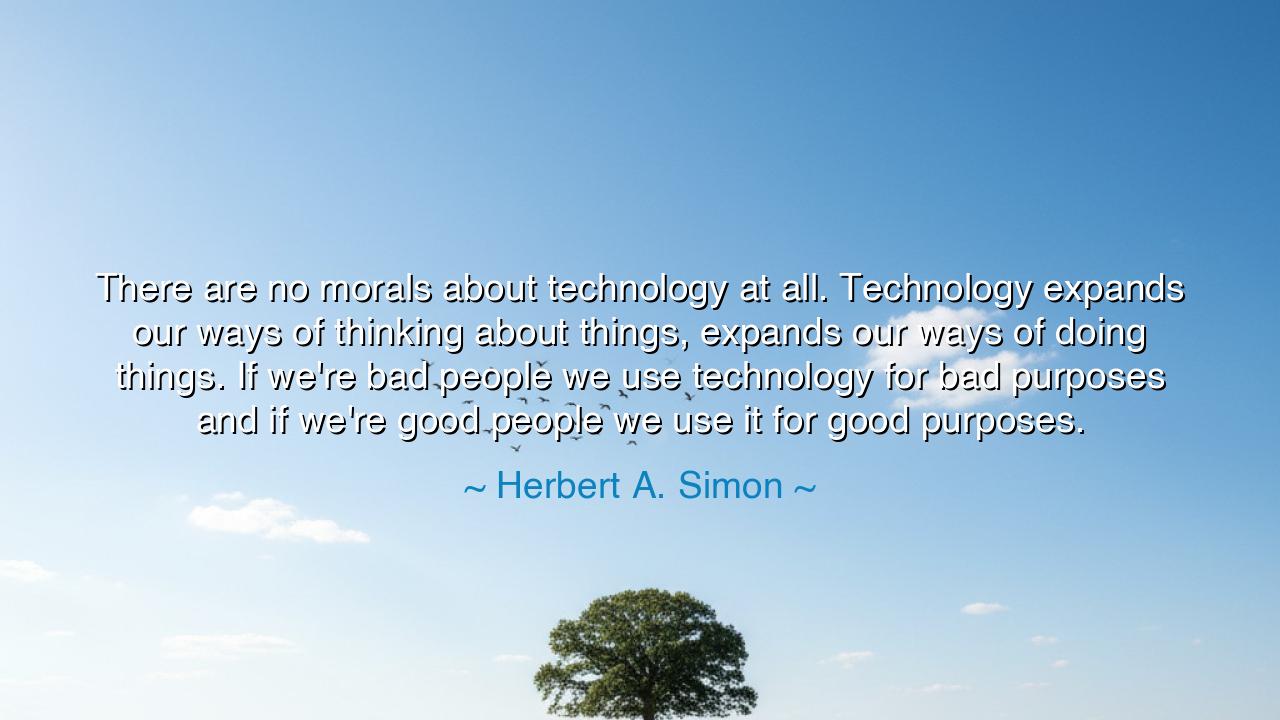
There are no morals about technology at all. Technology expands
There are no morals about technology at all. Technology expands our ways of thinking about things, expands our ways of doing things. If we're bad people we use technology for bad purposes and if we're good people we use it for good purposes.






The words of Herbert A. Simon—“There are no morals about technology at all. Technology expands our ways of thinking about things, expands our ways of doing things. If we're bad people we use technology for bad purposes and if we're good people we use it for good purposes”—speak with the timeless clarity of one who has seen both the promise and the peril of invention. Technology itself is neutral, a mirror of the human soul. It is not angel or demon, saint or tyrant; it is an instrument, an extension of the mind and the will. It reveals us more than it creates us. It does not decide what is good or evil; we do.
The origin of this thought lies in the very story of human progress. From the beginning, mankind’s inventions—fire, the plow, the wheel, the forge—were born not from morality but from necessity and imagination. Fire could warm the cold and cook the meal, but it could also burn the village. Iron could craft the plowshare that fed a family or the sword that cut them down. The same tool, the same spark, served both mercy and destruction depending on the heart that wielded it. Simon, as a scholar of decision-making and human behavior, simply unveiled what history had already written in fire and steel: technology is power, and power serves the hand that commands it.
Consider the story of Alfred Nobel, the inventor of dynamite. His creation was meant as a blessing: a tool to aid miners, builders, and workers in breaking stone and forging pathways where none existed. Yet dynamite also became a weapon of war, turning fields into graves. Nobel, horrified that his invention had been turned to slaughter, left his fortune to fund the Nobel Prizes, that science and peace might be remembered above destruction. This story proves Simon’s point: technology has no morals—it only magnifies the morality of those who wield it.
So too, the tale of the printing press bears this truth. When Gutenberg’s press spread across Europe, it became a fountain of knowledge, placing holy texts, literature, and learning into the hands of common people. Yet that same press spread lies, propaganda, and venom that fueled wars and persecutions. The press itself was not moral or immoral. It was the hands of men—priests, poets, tyrants, reformers—that gave it voice. Technology simply widened the reach of both wisdom and folly.
And in our own age, the story repeats with digital technology and artificial intelligence. The internet has become a beacon, connecting villages and continents, bringing knowledge to children in remote lands. Yet it also serves as a web for deception, division, and exploitation. The AI that can heal, predict disease, and design wonders can also be turned into a weapon of surveillance, manipulation, or destruction. The tool itself is silent. It waits for the soul of its wielder to give it purpose.
The lesson for us is clear: do not look to technology for salvation or damnation. Look to yourself. If you are good, if you are just, then use technology to uplift, to heal, to connect, to enlighten. If you are selfish, cruel, or reckless, then technology will magnify that darkness. The heart of the matter is not in the machine but in the soul of man. Thus, to fear technology is folly; to ignore our own moral responsibility is the true danger.
In practice, this means approaching each new invention with discernment and integrity. Ask not only what can this do? but what should this do? Use tools to lighten burdens, not to multiply greed. Use knowledge to build bridges, not to deepen divisions. Teach your children not only how to use technology, but how to use it well—with honor, compassion, and justice. For the machine does not choose. You do.
So let Simon’s words echo like a timeless command: “Technology has no morals. It expands our ways of doing, but we decide what is done.” Be, therefore, the master of your tools, not their slave. Fill them with the light of virtue, and they will magnify your goodness. Abandon them to pride and cruelty, and they will magnify your corruption. The destiny of mankind is not written in machines, but in the hands—and hearts—of those who wield them.






AAdministratorAdministrator
Welcome, honored guests. Please leave a comment, we will respond soon